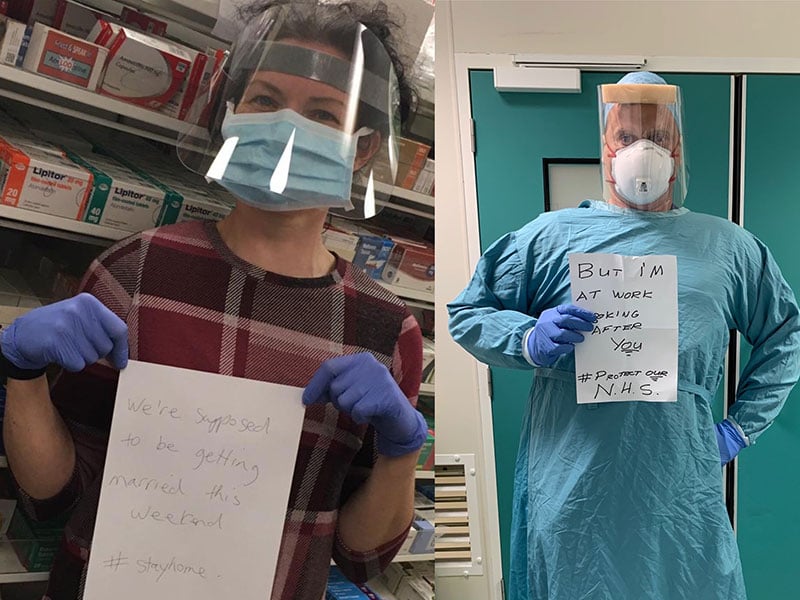Barira is HCPC registered dietitian who originally studied in Pakistan before moving to the UK.
Please note this story was published in 2021 and includes references to our previous international applications system, which used paper application forms. International applications are now made online. However, the process of preparing for them remains the same.

Here she shares her story whilst providing insight into the HCPC international application process and offering helpful tips and advice for anyone considering applying for HCPC registration via this route.
The international application route exists for applicants that have completed professional training outside of the UK. As someone who meets this criteria, you may be thinking about how to apply via the international route or where to access the international application forms. You can also find information about english language proficiency, background and verification checks and more on the international applications section of our website.
Barira shares her story and top tips for other international applicants
I’ve always admired dietitians working in the UK and the fact that there are national-level regulatory bodies like HCPC and organisations like the British Dietetics Association (BDA) that provide professional support and indemnity insurance to all its members. Something I didn’t have access to in my native country.
How I embarked on my international application for HCPC registration
The first step for me was going through the registration criteria on the website. I wasn’t even sure if I’d be able to get registered, even though I was qualified.
I must emphasise that it is very important that you go through all the standards before applying. This includes the Standards of Proficiency for the profession that you are applying for (in my case Dietitian). This made it easier to understand what standards HCPC registered professionals must meet to become registered and remain on the Register.
The HCPC has all the necessary guidance available on their website along with the application forms.
I started by writing down a list of the documents that I would need to submit alongside my application form. I wrote about each of them below:
I made sure I prepared for the IELTS academic exam. I know that sometimes the fear of not fulfilling the test criteria can make us nervous about taking the exam, but if I can do it, so can you.
It is important to take note of the marking criteria the examiners use to mark your exam and then practicing on those points. There are 4 parts of an IELTS academic test including:
- Speaking
- Listening
- Writing
- Reading
Each part has different marking points. I found the writing part the most challenging, but I scored 7.5 overall and with no element below 6.5.
Once you are ready to take the test, you can book your test by registering at the British Council website. You can choose a date that suits you and you can either do it on a computer or handwritten. I completed mine on the computer, which was pretty straightforward.
On the day of the exam, don’t forget to take a copy of your ID card, the confirmation printout for the test date, as well as the credit card that you used to pay for the exam fee. I remember when I went for my exam, they asked for these documents but there was no mention that you needed these documents in the confirmation email.
You need to provide a proof of your identity along with your application, so make sure your ID card is valid and has not expired. Also, if you have had a change of name e.g. due to marriage then you will need to provide additional documents like a marriage certificate.
I would advise you to get all your documents translated into English and verify them before starting the application. My marriage certificate was in both languages; Urdu and English, so I didn’t have to get it translated.
You will also need to provide proof of the address of where you live. For this, you can use any utility bill under your name with the current address included. Make sure this is a recent one and is dated within the last six months.
You will need to fill in the course information form for each of your qualifications. For me, this was the most challenging and time-consuming part of the application. This was because some of my educational institutions were more responsive than others.
You need to get in touch with your various educational institutions and request information from them. I did so via email and asked them provide my course details, which I then copied and pasted into the form template.
Make sure you add the subjects you studied and mention all the projects you did. HCPC wants to know which courses you took, rather than the general outline. After carefully finishing the form, get it signed and stamped by the respective institutions.
You will also need to provide references from each educational institution. It can be either a teacher, course leader or head of the department. Make sure you have their official work email address. Personal email addresses e.g. Google Mail etc. are not accepted by the HCPC.
Be mindful when filling the 'course start date' and 'degree awarded/issued date'. Countercheck these from your admission card or degree information. You can also double check these dates with your references, it is also good they know the exact dates you have mentioned in the application.
Submit a copy of the signed and stamped course form to the education provider as well for record-keeping. At the same time, you can also request a character certificate to go along with your application.
For this part, you’ll need to show letters and/or certificates you've received from respective organisations. You can also attach recommendation letters from your employer or mentor. You’ll have to provide references for this part as well. You also need to write a description of what you did in the application. Make sure to add the most important bits. If you are a member of an organisation also mention it here.
If you are registered with any professional body (i.e. like the Pakistan Nutrition and Dietetics Society in my case), then mention it in this section. It always helps if you are registered with your country’s professional body.
The process of submitting the form
After completing all parts of the application form, along with all supplementary information, you should then sign and date the declaration. You should also scan and print a copy of the whole application for your records. Then send your original application form, via courier service, to the HCPC Registration department.
Once your application has been checked for completeness, you’ll receive an email requesting payment of the scrutiny fee. Note that this fee is non-refundable.
The time it takes to process your form
After the payment of the scrutiny fee, the HCPC international registration team will begin the initial process and begin contacting all the referees and conduct any background checks.
They might contact you if there's a delay in hearing back from your referees, so keep an eye on your emails.
After verification is complete, your education and training and any other relevant experience will be assessed against the HCPC standards. This is done by two individual assessors from the part of the Register to which you are applying.
They will consider all the information you have submitted before making their recommendation and it can take approximately 2-3 months. But you’ll hear their final verdict within 60 days from the receipt, unless there is a request for further information which will prolong the processing time of your application. You can learn more about the full timescales on their website here.
If you are accepted for registration, you’ll then receive an email with your registration number and a link to pay the registration fee. More information about the exact amount can be found here.
My top tips on the application process
- Keep a copy of your application for your reference and send the original via a courier service to the HCPC.
- For your proof of identity and address documents, make sure it matches the one where you live and is signed and dated by someone of professional standing within the community.
- Make sure you provide a valid email address, as all the communication regarding the application is done over email.
- It’s always a good idea to keep in touch with your referees and request them to respond to the email from HCPC promptly, as this could potentially slow down the process.
More about Barira
Barira Saad is a dietitian registered in Pakistan and United Kingdom. She is working within the NHS full time, and as a health writer on the side. She runs her own website which is a blog about her dietetics journey and food and nutrition related information. She also runs a Facebook group called 'Dietetics Corner' for other dietitians, nutritionists and students.
- Cyhoeddwyd:
- 14/05/2021
- Resources
- In your words
- Is-gategori:
- #myHCPCstandards
- Audience
- Cofrestredig
- Profession
- Dietitians

